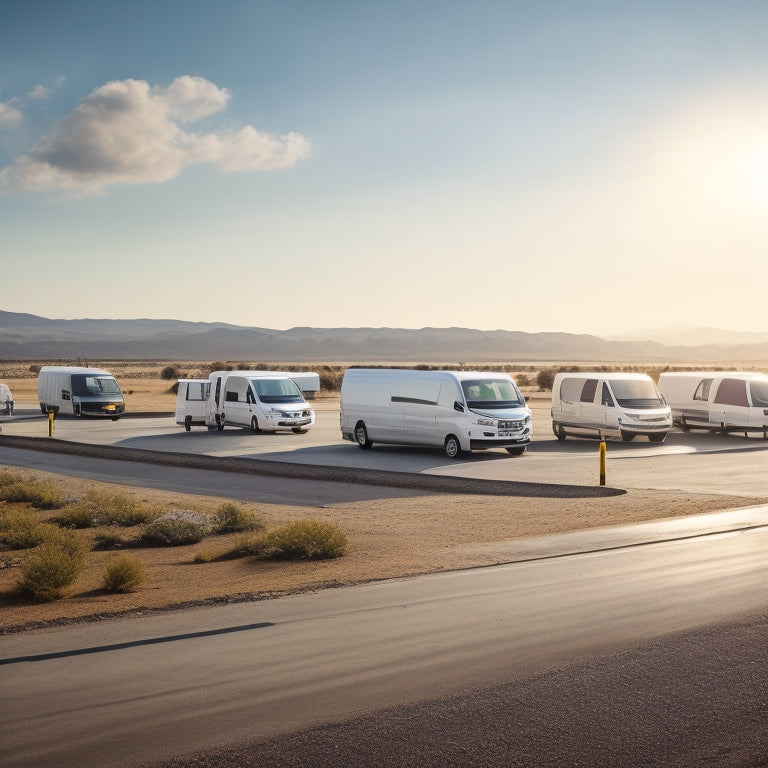
What Are the Best Fleet Vehicle Solar Options?
Share
You're considering solar power for your fleet vehicles, and choosing the right option can be overwhelming. Look for top brands like Renogy, HQST, and WindyNation, which offer high-efficiency panels and durable designs. Assess your fleet's power needs and balance wattage with energy density. Prioritize rugged panels with UV-resistant materials and IP67 ratings. Easy installation options and maintenance tips are also essential. With the right solar solution, you can reduce fuel consumption, lower emissions, and increase efficiency. Now, explore the key factors to find the best fit for your fleet.
Key Takeaways
• Renogy, HQST, and WindyNation are reputable brands offering high-quality solar panels with UL and ETL certifications for safety and performance.
• Choosing the right wattage is crucial, balancing power output and energy density while considering panel size, weight, and device power requirements.
• Durable solar panels with rugged designs, IP67 ratings, and UV-resistant materials ensure resistance to harsh weather conditions and optimal performance.
• Easy installation options with plug-and-play designs, magnetic mounts, and adhesive strips enable quick and damage-free setup, ensuring fleet operational efficiency.
• Custom solar solutions can be optimized for tailored energy harvesting, seamless integration, and enhanced safety measures, resulting in reduced operating costs and improved fleet efficiency.
Top Solar Panel Brands
When it comes to outfitting your fleet vehicles with solar panels, selecting a reliable brand is crucial, and you'll want to contemplate top brands like Renogy, HQST, and WindyNation that offer durable and efficient solar solutions. These brands have established a strong brand reputation in the industry, backed by industry certifications such as UL (Underwriters Laboratories) and ETL (Intertek) certifications, ensuring their products meet rigorous safety and performance standards.
You'll want to look for brands that have a proven track record of delivering high-quality products and excellent customer support. Renogy, for instance, is known for its high-efficiency solar panels and robust warranties. HQST, on the other hand, offers a range of solar panel kits specifically designed for fleet vehicles, with a focus on durability and ease of installation. WindyNation, meanwhile, provides a variety of solar panels and accessories, including charge controllers and mounting hardware, all backed by a commitment to quality and customer satisfaction.
Fleet Vehicle Solar System Costs
When contemplating fleet vehicle solar options, you'll need to factor in the costs.
You'll want to calculate the system purchase price, which includes the solar panels and necessary hardware.
Additionally, you'll need to take into account installation labor costs and ongoing maintenance fees to get a clear picture of your total investment.
System Purchase Price
Your fleet vehicle solar system costs will likely be one of the most significant upfront expenses, with prices ranging from $1,000 to $5,000 or more, depending on the size and type of system you choose. The cost of the system itself is a significant portion of your overall expenditure.
When considering your upfront costs, it's essential to factor in the quality and durability of the system. A higher-priced system may be more reliable and last longer, while a cheaper option might require more frequent replacements.
To make your purchase more manageable, you may want to explore financing options. Many suppliers offer financing plans or leasing arrangements that can help spread the cost over time. This can be particularly helpful if you're purchasing multiple systems for your fleet.
Be sure to research and compare different financing options to find the one that best suits your business needs. By understanding the upfront costs and exploring financing options, you can make an informed decision that meets your budget and safety requirements.
Installation Labor Costs
You'll need to factor in installation labor costs, which can add up quickly, ranging from $500 to $2,000 or more, depending on the complexity of the installation and the installer's rates. These costs can vary depending on the installer, the size of the system, and the type of vehicle.
Here are some key factors to take into account when calculating installation labor costs:
-
Installer's rates: Labor rates can vary greatly depending on the installer's experience, location, and certifications.
-
System complexity: More intricate systems, such as those requiring custom mounting solutions, will necessitate more labor hours and raise costs.
-
Vehicle type: Larger or more complex vehicles, such as buses or trucks, may require more labor hours and specialized equipment, increasing costs.
- Labor Union rates: If you're working with a Labor Union, their rates may be higher than non-union labor, impacting your overall cost analysis.
When conducting a cost analysis, make sure to take into account these variables to get an accurate estimate of your installation labor costs. By understanding these factors, you can better plan and budget for your fleet vehicle solar system installation.
Ongoing Maintenance Fees
In addition to upfront installation costs, fleet owners must also take into account ongoing maintenance fees, which can range from 1% to 5% of the total system cost annually, depending on the scope of maintenance and the provider's rates. These fees can add up quickly, so it's vital to factor them into your budget planning.
When calculating the total cost of ownership, you'll want to conduct a thorough cost analysis to make sure you're prepared for these recurring expenses.
Regular maintenance is important to guarantee your solar system operates at peak levels, and providers may offer different tiers of maintenance packages. Be sure to review the scope of work, response times, and rates before signing a maintenance contract.
You may also want to contemplate self-performing maintenance tasks or training your team to reduce costs. By understanding these ongoing fees, you can better plan your budget and maximize your return on investment.
Solar Panel Efficiency Matters
When selecting solar panels for your fleet vehicles, it's crucial to take into account the efficiency of the panels, as it directly impacts how much power they can generate. You want to make sure that your solar panels can produce the maximum amount of energy possible, especially when you're relying on them to power your fleet's operations.
Here are some key factors to bear in mind when evaluating solar panel efficiency:
-
Panel Degradation: Solar panels degrade over time, reducing their efficiency. Look for panels with a low degradation rate to guarantee they continue to perform well throughout their lifespan.
-
Thermal Impacts: High temperatures can reduce solar panel efficiency. Choose panels with a low temperature coefficient to minimize thermal impacts.
-
Panel Quality: High-quality panels with efficient cells will generate more power than lower-quality panels.
- Certifications: Look for certifications like UL and IEC, which ensure the panels meet certain efficiency and safety standards.
Choosing the Right Wattage
With your fleet's specific power needs in mind, selecting the right wattage for your solar panels is crucial to guaranteeing you're generating enough energy to support your operations. You need to take into account how much power your fleet's devices and equipment require to function efficiently.
A higher wattage solar panel doesn't always mean it's the best choice. You need to strike a balance between power output and energy density, which affects the panel's size and weight.
For instance, a 200-watt solar panel might provide more power, but it might also be larger and heavier, impacting your vehicle's overall performance. On the other hand, a 100-watt panel might be more suitable for your fleet's power needs, taking up less space and reducing weight.
When selecting the right wattage, think about the devices you need to power, the space available, and the weight constraints of your vehicles. By choosing the appropriate wattage, you'll ensure your solar panels provide the necessary energy to support your fleet's operations while maintaining efficiency and safety.
Durable Solar Panels for Fleets
You'll want solar panels that can withstand the rigors of daily fleet operations, so look for durable options that can resist harsh weather conditions and rough handling.
When selecting solar panels for your fleet, prioritize rugged designs that can withstand the elements. Look for panels that have undergone rigorous weather testing to make sure they can perform in extreme temperatures, heavy rain, and intense sunlight.
Here are some key features to look for in durable solar panels:
-
IP67 or higher rating: Guarantees protection against dust and water ingress.
-
UV-resistant materials: Prevents degradation from prolonged sun exposure.
-
Anodized aluminum frames: Provides added strength and corrosion resistance.
- Tempered glass or polycarbonate surfaces: Offers enhanced durability and impact resistance.
Easy Installation Options
Install solar panels on your fleet vehicles quickly and easily by opting for systems that feature simple, plug-and-play designs. This way, you can minimize downtime and get your vehicles back on the road sooner.
Look for systems with magnetic mounts or adhesive strips that allow for easy installation and removal. These options eliminate the need for drilling or welding, reducing the risk of damage to your vehicles. Additionally, they enable you to transfer the solar panels to different vehicles if needed.
With easy installation options, you can focus on what matters most - keeping your fleet operational and efficient. By choosing a system that's easy to install, you'll save time and resources, ensuring your fleet stays on the move.
Plus, many of these systems are designed with safety in mind, so you can have peace of mind knowing your vehicles are equipped with reliable and secure solar panels.
Solar Panel Maintenance Tips
How often do you inspect your fleet's solar panels to maintain peak energy harvesting and prevent unexpected downtime? Regular maintenance is important to guarantee your solar panels operate at their best. Neglecting maintenance can lead to reduced energy output, decreased panel lifespan, and even safety hazards.
Here are some essential solar panel maintenance tips to keep in mind:
-
Regular Cleaning: Clean your solar panels regularly to remove dirt, dust, and debris that can reduce energy output. Use a soft brush and mild soap to avoid damaging the panels.
-
Inspect for Damage: Inspect your solar panels regularly for signs of damage, such as cracks, broken glass, or loose connections.
-
Weather Resistance: Ensure your solar panels are designed and installed to withstand harsh weather conditions, such as heavy rain, hail, and extreme temperatures.
- Electrical Checks: Perform regular electrical checks to make sure your solar panels are operating within safe voltage and current ranges.
Benefits of Solar Powered Fleets
Moreover, by maintaining your solar panels properly, you can now reap the benefits of solar powered fleets, including reduced fuel consumption, lower emissions, and significant cost savings.
With solar power, you'll reduce your reliance on fossil fuels, decreasing your fleet's environmental impact and contributing to a cleaner, healthier environment. This eco-friendly approach not only benefits the planet but also your bottom line.
Solar powered fleets can help you save money on fuel costs, which can add up quickly, especially for large fleets. Additionally, solar power can increase your vehicles' efficiency, extending their lifespan and reducing maintenance costs.
Moreover, many governments offer incentives for eco-friendly initiatives, providing additional cost savings. By switching to solar powered fleets, you'll not only reduce your environmental impact but also boost your business's financial performance.
With these benefits, it's no wonder many fleets are making the switch to solar power.
Custom Solar Solutions Available
You can tailor solar solutions to your fleet's unique needs, guaranteeing a seamless integration with your existing infrastructure. With custom solar solutions, you can optimize your fleet's energy efficiency and reduce its carbon footprint. By working with experienced solar engineers, you can design and implement a solar solution that meets your specific requirements.
Here are some benefits of custom solar solutions:
-
Optimized Energy Harvesting: Maximize energy production with solar panels designed to fit your fleet's specific energy needs.
-
Seamless Integration: Guarantee a smooth integration with your existing infrastructure, minimizing downtime and disruptions.
-
Enhanced Safety: Custom solutions prioritize safety, ensuring that your solar-powered fleet operates reliably and efficiently.
- Fleet Optimization: With custom solar solutions, you can optimize your fleet's performance, reducing operating costs and improving overall efficiency.
Frequently Asked Questions
Can Solar Panels Be Installed on Leased Fleet Vehicles?
"As you consider solar panels for your leased fleet vehicles, you'll need to check your lease agreement for restrictions on customizations, ensuring you're not voiding your lease, and weigh the benefits against potential penalties or fees."
Do Solar Panels Affect Fleet Vehicle Insurance Rates?
You're wondering if solar panels impact your fleet vehicle insurance rates. The answer is, it depends on the insurer's risk assessment. If they consider solar panels a lower risk, your insurance premiums might decrease, but it's not a guarantee.
Are There Any Government Incentives for Solar-Powered Fleets?
You can capitalize on government incentives for your solar-powered fleet, such as tax credits and grant opportunities, which can help offset the upfront costs and make your eco-friendly investment more financially viable.
Can Solar Panels Be Transferred to New Fleet Vehicles?
"Hey, you're probably wondering if you can just slap those solar panels on your new ride, right? Well, the good news is, yes, you can transfer them, but only if you choose durable panels that can withstand vehicle upgrades."
Do Solar Panels Void Fleet Vehicle Warranties?
You're right to worry about warranty concerns! Typically, solar panels don't void fleet vehicle warranties, but it's important to review manufacturer policies to guarantee compliance, as some may have specific requirements or restrictions.
Related Posts
-

Why Choose Recycled Paper for Earth-Conscious Business?
By choosing recycled paper, you'll greatly reduce your business's environmental impact. You'll lower your carbon foot...
-

3 Ways Wind Power Boosts Home Value
Living near a wind farm can enhance your property's value in three significant ways. To begin with, proximity to wind...
-

Why EVs Inspire Earth-Conscious Home Design Choices
As you shift to an electric vehicle, you're not just switching to a greener ride, you're igniting a broader commitmen...


